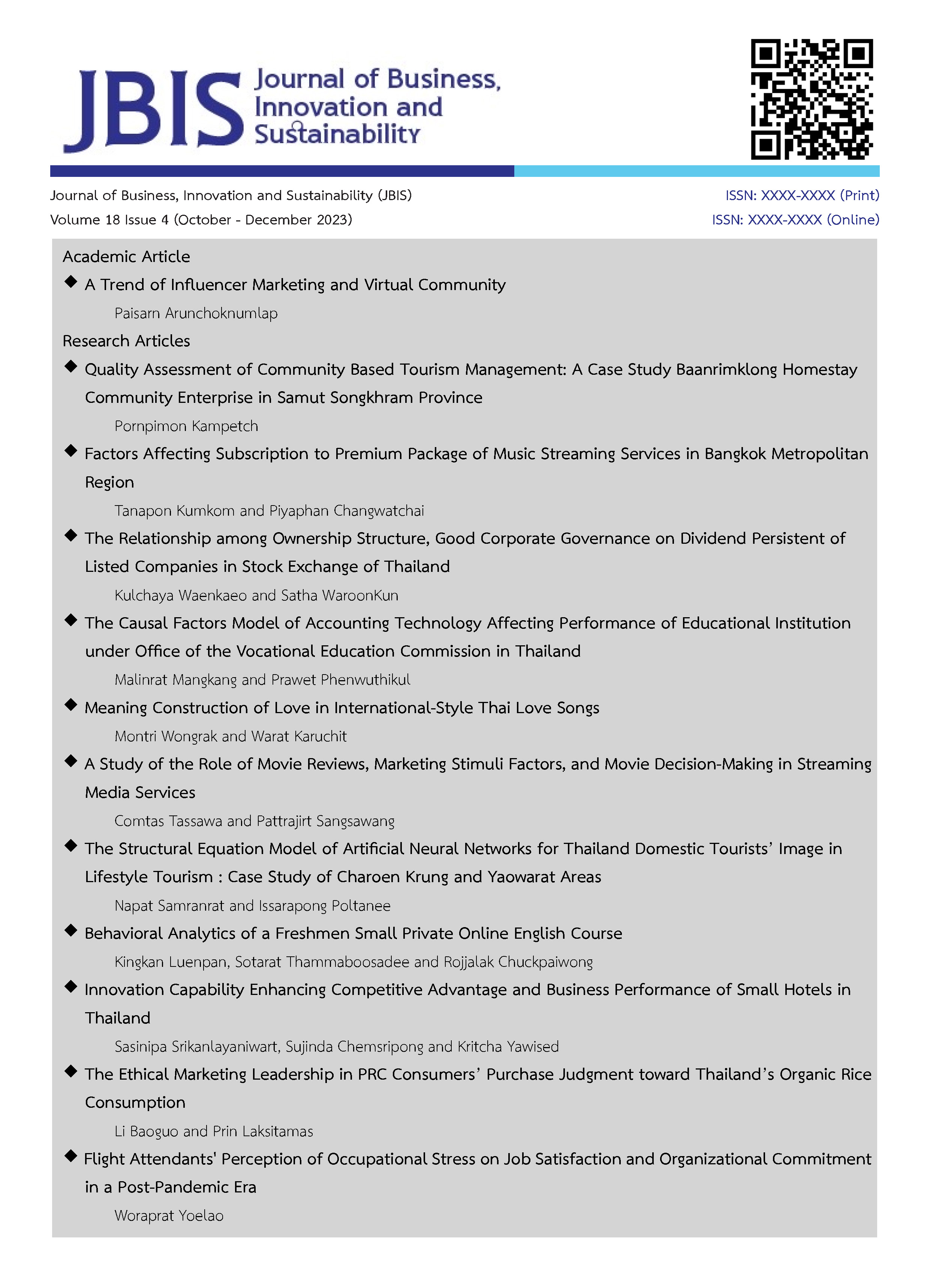Quality Assessment of Community Based Tourism Management: A Case Study Baanrimklong Homestay Community Enterprise in Samut Songkhram Province
Main Article Content
บทคัดย่อ
This research studies the history and assess the quality assessment of community-based tourism management by Baanrimklong Homestay community enterprise in Samut Songkhram Province. The research is qualitative research, the informant is a member of the ban Rim Khlong homestay community enterprise, using an in-depth interview method about its history, and conducts interviews directly from the group president and records the responses in a quality assessment community-based tourist destinations that is set by Ministry of Tourism and Sports, Thailand. The research result reveals that Baanrimklong homestay started its business operation with the main focus on tourism which comprises homestay, sightseeing the livelihood of coconut farmers according to the culture of central Thailand, culture and local wisdom heritage, and learning booths (such as collecting coconut nectar, Thai desserts, tie dye handicrafts, making coconut sugar, cycling, and touring agricultural farm, etc.). The assessment result of quality standard of CBT location Baanrimklong homestay under the CBT development criteria in Thailand suggests that the score on quality standard of CBT location Baanrimklong homestay is 63.94 which is considered as fairly good. When all factors are considered, the affecting factor that has the highest score is the management of economic and social components, and quality of life (score is 20). Lesser score is the factor on conserving and supporting cultural heritage (score is 13.33). Additionally, the factor on the management of CBT has the score of 10.91. The factor on services and safety has the core of 11.00, whereas the factor on systematic and sustainable management of natural resources and environment has the score of 9.33, respectively.
Article Details

อนุญาตภายใต้เงื่อนไข Creative Commons Attribution-NonCommercial-NoDerivatives 4.0 International License.
เอกสารอ้างอิง
Bagus, S. I., Imade, S. U., Nyoman, S. I. A. and Putu, W. S. N. (2019). Community based tourism as sustainable tourism support. Russian Journal of Agricultural and Socio-Economic Sciences, 94(10), 70-78.
Community Tourism Institute. (2010). Community-based tourism. Retrieved March 20, 2022, from http://www.cbt-i.or.th/ge=cbti/
Ministry of Tourism and Sports, Thailand. (2018). Framework for mobilization and development of sustainable and creative CBT B.E. 2561-2565, and the selective criteria for 303 communities. Retrieved March 20, 2022, from https://secretary.mots.go.th/ewtadmin/ewt/secretary/news_view.php?nid=1481/
Fennell, D. A. (2000). Tourism and applied ethics, Tourism recreation research, 25(1), 59–70.
Giampiccoli, A. and Saayman, M. (2018). Community-based tourism development model and community participation. African Journal of Hospitality, Tourism and Leisure, 7(4), 1-27.
Kaisri, K., Chuenyindee, T., Yongphet, P. and Phunphon, T. (2021). A study of the impacts of the COVID-19 situation affecting community tourism areas in Pathum Thani province. Journal of Suvarnabhumi Institute of Technology, 7(2), 550-557.
Kampetch, P. and Jitpakdee, R. (2019). The potential for key success of community-based tourism sustainability: Case study Baan Rim Klong Homestay, Samut Songkram, Thailand. ABAC Journal, 39(4), 111-122.
Kerdjan, O. (2014). The participation of local community in Eco-tourism management at Klongkon Mangrove Forest in Samutsongkhram province. Master thesis, B.A., Dhurakij Pundit University, Bangkok.
Kunjuraman, V. and Hussin, R. (2017). Challenges of community-based homestay programme in Sabah, Malaysia: Hopeful or hopeless. Tourism Management Perspectives, 21, 1-9.
Patanachan, J. (2020). Community based tourism management case study Wat Tarn community Pa-Mok district Ang-Thong province. Master thesis, M.A., Silpakorn University, Bangkok.
Pechmon, T., Sriharan, P., Sompan, P. and Muenhus, S. (2021). Thai tourists’ satisfaction with ecotourism and adventure destinations in Nopphitam district of Nakhon Si Thammarat. Hatyai Academic Journal, 19(2), 327-343.
Phunnarong, S. (2021). Factors affecting the success of community-based tourism (CBT) in Homestay form. Journal of Community Development Research (Humanities and Social Sciences), 14(4), 14-27.
Samut Songkhram Office. (2014). Samut songkhram strategic plan to enter ASEAN B.E. 2558- 2560. Retrieved March 20, 2022, from http://www.samutsongkhram.go.th/aseanskm/pdf/asean-skm.pdf/
Sriharun, P. and Kampetch, P. (2018). Community tourism: A new alternative to sustainability. Dusit Thani College Journal, 12(3), 118-132.
SuanSri, P. (2003). Community based tourism handbook. Bangkok: Responsible Ecological Social Tour.
Suansri, P. and Richards, P. (2013). Directions towards a credible and high-quality Thai community based tourism standard. In J. Hummel, H. de Jong, & K. Dhiradityakul (Eds.), Innovating CBT in ASEAN: Current directions and new horizons (pp. 36-46). Bangkok: Winida Karnpim.
Sriwilai, S. and Thongsri, R. (2021). The effects of the spread of COVID-19 pandemic on Thai tourism. Journal of Legal Entity Management and Local Innovation, 7(8), 405-416.
Mindzeng, T. N. (2018). Community-based tourism and development in third world countries: The case of the bamileke zone of Cameroon and the influence of traditional institutions. Sustainable Tourism VIII, 227, 117-127.
Thai post. (August 30, 2021). The third draft national development plan for sustainable tourism. Retrieved March 20, 2022, from https://www.thaipost.net/main/detail/115068/
Wannaosote, W. and Pooripakdee S. (2019). The effects of homestay standards in sustainable tourism of community enterprise: Baanrimklong homestay, Muaeng, Sumut Songkhram. Veridian Silpakorn University (Humanities, Social Sciences and Arts), 12(4), 859-872.


